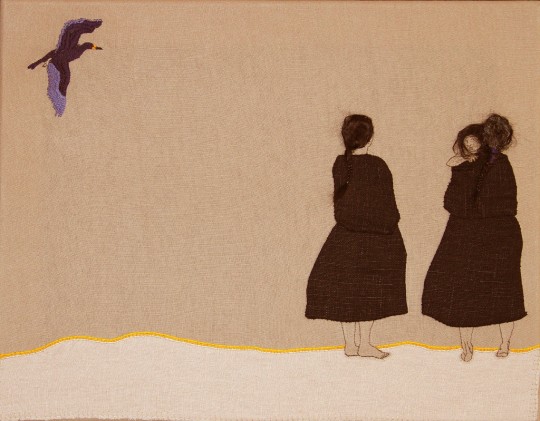
Three Women, 2013. Fabric, embroidery floss, viscose. By Emily O’Leary.
Stories of Self is a(n approximately) monthly essay series by Scott F. Parker that explores the nature of the composed self through conversations with memoirists, theorists, artists, and possibly musicians.
A Tremendous Sense of Purpose with Kao Kalia Yang
When I asked Kao Kalia Yang to talk memoir, she suggested we meet at Precision Grind, a small café around the corner from her house in Minneapolis. The space was mostly empty when I arrived early on a Friday morning. I took my coffee to a corner table and listened as “The Lonesome Death of Hattie Carroll” gave way to “Restless Farewell.” If I was looking for omens, it was a good one for the interview. Of all Dylan, The Times They Are a-Changin’ has him in his most democratic spirit, willing to lend his voice to those who have been denied one. As soon as his next album, Another Side of Bob Dylan, he would start to retreat from the explicitly political.
The accompaniment of this soundtrack was synchronistic for a conversation about Kalia’s work. Her first book, The Latehomecomer: A Hmong Family Memoir, had earned Kalia the mantle in the Hmong-American community as the voice of her generation. But not just hers. The Latehomecomer speaks as clearly for her parents’ and grandparents’ generations, those who survived the wars in Southeast Asia and found refuge in the U.S. It was the first nationally published book in the U.S. by a Hmong author and continues to be the most widely read.
I wondered if Kalia anticipated ever turning away from her political heritage. The standard reading of Dylan’s turn away from “finger-pointing songs” after The Times was that he wanted to guard against the possibility that his music could be reduced to its social function—that is, propaganda. The political stakes for Kalia, though, are, if not necessarily higher, certainly much more personal than they ever were for Dylan.
Kalia’s second book, The Song Poet, which her agent was about to send out on submission when we met, is a memoir about her father. It is structured like an album, and Kalia says was much more difficult than The Latehomecomer to craft, but it follows her debut’s model of collaboration with her subjects. She says it is a shared responsibility with her father. Whether she’ll continue to work in this vein she can’t say, but for now telling her family’s stories is the most urgent work there is for her to do.
This urgency is apparent in The Latehomecomer and it’s one of the...
You have reached your article limit
Sign up for a digital subscription and continue reading all new issues, plus our entire archives, for just $1.50/month.
Already a subscriber? Sign in




